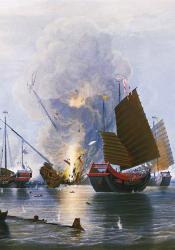China
The People’s Republic of China is presently the world’s most populous country and one of the largest by area. Historically, China has been ruled by imperial dynasties dating back to the twenty-first century BCE, such as the Xia dynasty (c. 2070 – 1600 BECE), the Qin dynasty (221- 206 BCE), the Han dynasty (206 BCE – 220 CE), and the Tang dynasty (618 – 907 CE). The Mongol Empire conquered China in 1271 under famed leader Kublai Khan, who established the Yuan dynasty. The Ming dynasty took power in 1368 CE (and ruled until 1644 CE) and China experienced a golden age of arts and culture with a flourishing economy. The Silk Road connected parts of China and East Asia to the Arabian Peninsula and Southern Europe and became a significant trading route. Culturally, Confucianism plays a great role for many Chinese arts. In particular, calligraphy, painting, and poetry are highly esteemed.
During the nineteenth century, the Qing dynasty (1636 - 1912), with ethnic origins in Manchuria, was in power. Western imperialism and unrest characterized the latter portion of Qing rule, particularly after the White Lotus Rebellion (1794 – 1804 CE) and the deaths of 100,000 people. From 1861-1908, China was effectively albeit not nominally ruled by the Empress Dowager Cixi (1835-1908), sometimes called “Tzu His” or “the Dowager Empress,” a Manchu woman and consort of the Xiangfeng Emperor, who had died in 1861. Cixi’s complex legacy involves allegations of autocracy and reform-mindedness, the latter perhaps most apparent in her support of the “Self-Strengthening Movement” of 1861-95.
During Cixi’s reign, China and Great Britain fought the Opium Wars, the First from 1839 to 1842 and the Second (with France as well) from 1856 to 1860, in which the British government fought to secure the opium trade and obtain favorable tariffs. In 1841, Britain occupied the island of Hong Kong; the 1842 Treaty of Nanking forced China to ceded it to Britain, whereupon it became a Crown Colony. During the Second Opium War, British troops under Lord Elgin attacked the Yuanming Yuan (known in English as the Summer Palace), resulting in the destruction of 800 acres, the theft of countless pieces of prize art, and the deaths of three hundred people trapped in the palace. The Taiping Rebellion (1850 – 1864 CE) ultimately cost 10-30 million lives. Another 10 million died in the Northern Chinese Famine (1876 – 1879 CE) In 1895, at the conclusion of the First Sino-Japanese War, China ceded Taiwan to Japan and lost influence on the Korean Peninsula. The Yihetuan Movement (also called the Boxer Rebellion) from 1899 to 1901 was anti-imperialist uprising.
The Qing dynasty was deeply shaken by Cixi’s death in 1908. She was succeeded by the Xuantong Emperor—the two-year-old grandson of the late Xianfeng Emperor. In this power vacuum, dynastic rule ended in 1912 with the Xinhai Revolution and the Chinese Civil War. The leader of the Communist Party of China, Mao Zedong in 1949 established the People’s Republic of China on the mainland while the nationalist government represented by Chiang-Kai Shek, leader of theKuomintang (Chinese Nationalist Party) took refuge in in Taiwan where Chiang fomented the “White Terror,” or mass murder of the Kuomintang’s political opponents. Chairman Mao Zedong led the Great Leap Forward from 1958 to 1962 in attempts to restructure the largely agrarian economy into a Communist society. This policy resulted in between 15 and 140 million deaths, particularly from famine.
Coordinates
Longitude: 109.370119571690

